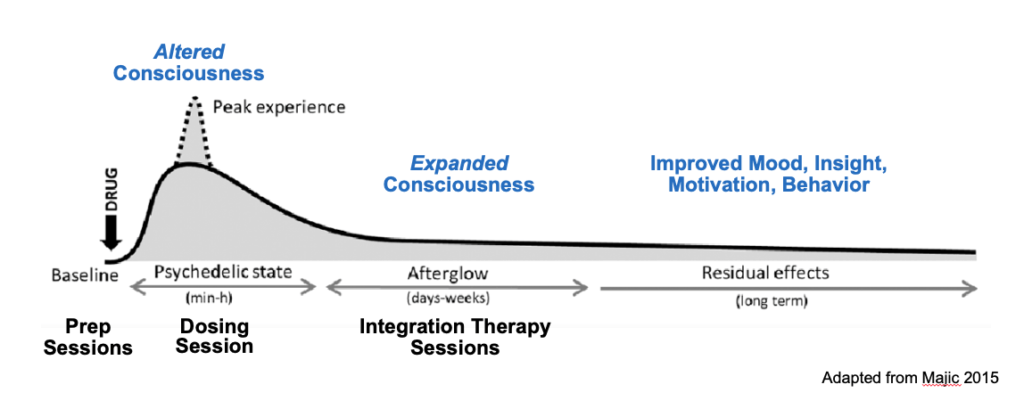

What is Ketamine Therapy?
by Keith Heinzerling
Ketamine therapy is a treatment approach that uses low doses of ketamine, a dissociative anesthetic medication, to manage various mental health conditions, such as treatment-resistant depression, anxiety disorders, and post-traumatic stress disorder (PTSD).
Ketamine is approved for use at high doses as an anesthetic in the operating room. Although not FDA-approved, lower dose “sub-anesthetic” ketamine injections are used “off-label” to treat depression, pain, and other mental health/substance use disorders.
In recent times, there have been many factors contributing to increased depression across wide populations. There are several medications available for depression, anxiety, and substance use disorders which involve daily administration of a medication aimed at correction of neurochemical imbalances via action at specific brain receptors (e.g. serotonin, dopamine, mu opioid).
Effects of Ketamine
In contrast, using a psychedelic-assisted therapy model with ketamine produces a short-lived but intense subjective experience—the mystical or peak experience—which triggers or elicits an afterglow, accompanied by a subsequent positive change in affect, insight, motivation, cognition, and behavior.

The potential for mystical experiences to produce rapid, profound, and sustained changes in insight, mood, behavior, and consciousness was recognized and first used by indigenous cultures in shamanic and other healing rituals. Psychedelic-assisted therapies for treating behavioral health disorders was studied extensively and safely in approximately 40,000 patients in North America in the 1950s and 1960s.
Patients with depression, anxiety, PTSD, end-of-life distress, chronic pain, drug/alcohol problems, and other conditions may be eligible for psychedelic-assisted therapy with ketamine.

How Does Ketamine Therapy Work?
Usually ketamine treatment includes one or a few in-clinic ketamine dosing sessions under clinician supervision integrated with preparatory and integration counseling.
Ketamine works by blocking the activity of the N-methyl-D-aspartate (NMDA) receptor, a receptor in the brain that is involved in the regulation of mood, cognition, and pain perception. Ketamine therapy is thought to have rapid-acting antidepressant effects, with many patients reporting improvements in their symptoms within hours to days after treatment.
By harnessing the potential psychedelic effects of ketamine, the aim is to achieve more sustained results with fewer ketamine treatments compared to IV ketamine infusions without accompanying psychotherapy.
Consider tackling and shedding some difficult issues and making a fresh start wherever you are in your life. As with any medical treatment, it is essential to discuss the potential risks and benefits of ketamine therapy with a healthcare professional before considering this treatment option.
For more information on ketamine treatment call: 310-582-7612

Interested in learning more about Ketamine-Assisted Psychotherapy? Schedule a consultation at a PNI clinic.
Schedule
About the Author

Keith Heinzerling
Dr. Keith Heinzerling practices internal medicine and is an addiction medicine specialist at the Pacific Brain Health Center, Pacific Neuroscience Institute. His clinical and research focuses are on the treatment of alcohol, drug and substance use problems, with anti-addiction medications. As director of the Treatment & Research In Psychedelics (TRIP) program, he is involved in the development of psychedelic-assisted therapies for those suffering with addiction, depression, anxiety, and PTSD. Dr. Heinzerling is a trained psychedelic guide and holds a Certificate in Psychedelic-Assisted Therapies and Research (CPTR) from the California Institute of Integral Studies (CIIS).
Last updated: April 4th, 2024